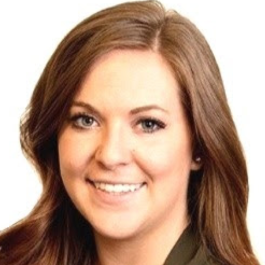Every sales professional knows the importance of nailing an effective sales pitch. Yet, it’s often one of the most challenging — and tedious — aspects of the sales process.
Those who have been in the industry long enough know firsthand how much practice goes into honing a sales strategy and, for many established sales pros, experience has shifted the way they approach the pitching process. For example:
- Flywire Travel Sales Manager Sydney Banks remembers how she had a pitch deck ready for every call at the beginning of her sales career. However, her decision to eventually let go of pitch decks has helped her pivot more easily and relate more closely to her clients, she said.
- For Klaviyo Sales Manager Jackie Condon, one of the most important lessons she’s learned is to leave out buzzwords in her pitches and opt for a more straightforward approach. She said doing has helped her cultivate stronger relationships — and ultimately close more deals.
Built In Boston caught up with Banks and Condon to hear how they have elevated the sales pitch process — and how others can do the same.
What they do: Flywire’s software enables people to make flexible payments internationally.
What’s the key to a successful sales pitch?
In my mind, the key to a successful sales pitch is doing everything you can to get to know who you’re selling to. I once heard someone say, “If you don’t know who you are pitching to, it’s hard to throw a strike,” and I think that’s very true.
This can be done by performing research ahead of time. For example, before a sales pitch, I always take time to understand who I’m speaking with because, depending on their position within their company, their goals for our conversation might be very different from mine. When I’m selling to travel businesses, the CEO or owner of the company might care more about saving money and the bottom line, whereas the head of operations probably feels the pain points of inefficient processes more acutely and might be more interested in how you can solve those problems.
I also use my pitch as an opportunity to ask questions about the business, the prospect, their day-to-day challenges and more. And then, most importantly, I listen very closely to their responses. By taking the time to understand and empathize with your prospect’s specific needs and pain points, you are then able to frame the conversation and your solutions in a way that sets you up for success.
What’s one change you’ve made that’s really elevated your sales pitch, and what impact has it had on your sales success?
When I first started in sales, I had a pitch deck ready to be shared for every call. It was partly a safety blanket for me to remember everything I wanted to say and partly what I thought was a best practice. When I decided to stop using sales decks in my pitches and initial calls with prospects a few years ago, I found that it immediately elevated my sales pitch. While you may not be able to fully distance yourself from pitch decks depending on your company, it’s worth seeing if you can simplify them.
By getting rid of my pitch decks, I no longer felt constrained by the content of my slides I could ask questions that I thought were the most relevant to the client given my research. Lacking a specific deck to follow along with also allowed me to pivot conversations and my pitch to each prospect.
I still often have visuals available if it’s beneficial and I will follow up with a deck that reviews what we talked about. Not forcing myself to go slide by slide during my pitch or discussing solutions or information that might not be relevant to the prospect has made a huge difference in boosting audience engagement, building rapport and being able to tailor my pitch on the fly.
Show them you’re not a sales robot. They’ll feel more comfortable and open and they will be more receptive to what you’re selling.”
What’s the most valuable piece of advice you could share with someone who’s looking to take their sales pitch to the next level?
Be a human. Flywire Vice President and General Manager of Travel Colin Smyth gave me this advice early on in my sales career and I pass it along to all new sales reps. It can be easy to spend time memorizing and rehearsing your pitch, but in an effort to come across confident and knowledgeable on calls, reps can instead sound rigid or unnatural. This can be a turnoff to prospects and make you seem inauthentic.
Figure out the main points of your pitch, get to know your product in and out, and practice what you’re going to say. When the meeting starts with your prospect, trust your knowledge about your company and offering and just have a conversation. It sounds basic, but in these times, it’s important not to just launch into a pitch and instead ask how people are doing. Ask how their business is being affected by current events. As the conversation continues, genuinely try to empathize with their pain points. Pause when you’re speaking and let the prospect react to what you’re telling them. They are human, so you should be, too. Show them you’re not a sales robot. They’ll feel more comfortable and open and they will be more receptive to what you’re selling.
What they do: Klaviyo’s platform helps e-commerce brands leverage their existing marketing channels and deliver targeted customer and prospect communications.
What’s the key to a successful sales pitch?
The key to a successful sales pitch is to make it brief and focus on the value. People’s attention span tends to be short, which is why it’s crucial for sales reps to have a pitch that is quick and direct. In one to two sentences, you should convey the problem that your product or service solves and what impact this could have on their business. Ideally, if you keep it concise and are communicating how this will positively affect their business, the prospect will invite you to share more detailed information.
What’s one change you’ve made that’s really elevated your sales pitch, and what impact has it had on your sales success?
Eliminate buzzwords from your vocabulary. I have found that when buzzwords are used in a sales pitch, the prospect immediately loses a great deal of interest and trust. Prospects are hearing the same words from every sales rep at every company describing their product or service. If every company uses words like “personalization” and “AI” and describes their product or service as “world-class,” these words lose their weight and value and come off as insincere and confusing.
Using a pitch that is not fluffy and is more direct has allowed me to build stronger rapport with prospects. Ultimately, I think people buy from people that they trust. By eliminating buzzwords from my vocabulary, I’ve fostered better relationships, progressed deals faster and closed more business.
Eliminate buzzwords from your vocabulary.”
What’s the most valuable piece of advice you could share with someone who’s looking to take their sales pitch to the next level?
I recommend drafting a sales pitch that you believe your grandparents — or anyone who is not an industry expert — could understand. The pitch should be simple and straightforward. From there, if necessary, add in additional talking points — not buzzwords — that your buyer would care about.
You should also make sure you are addressing what issue your product or service solves and what value it brings to your client. It’s important to identify if your sales pitch effectively answers those two questions. If it doesn’t, iterate the pitch and make sure those answers are abundantly clear.












